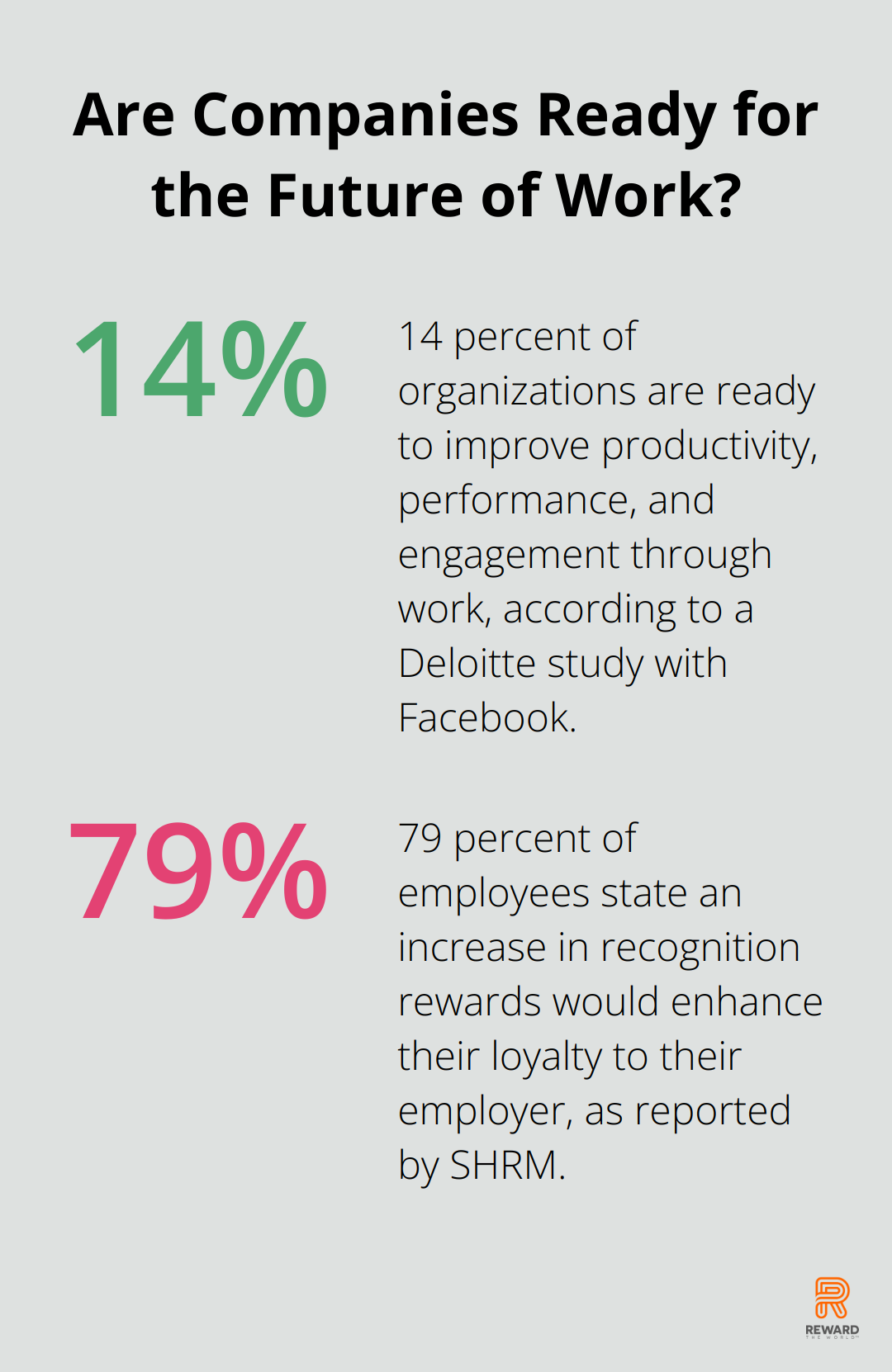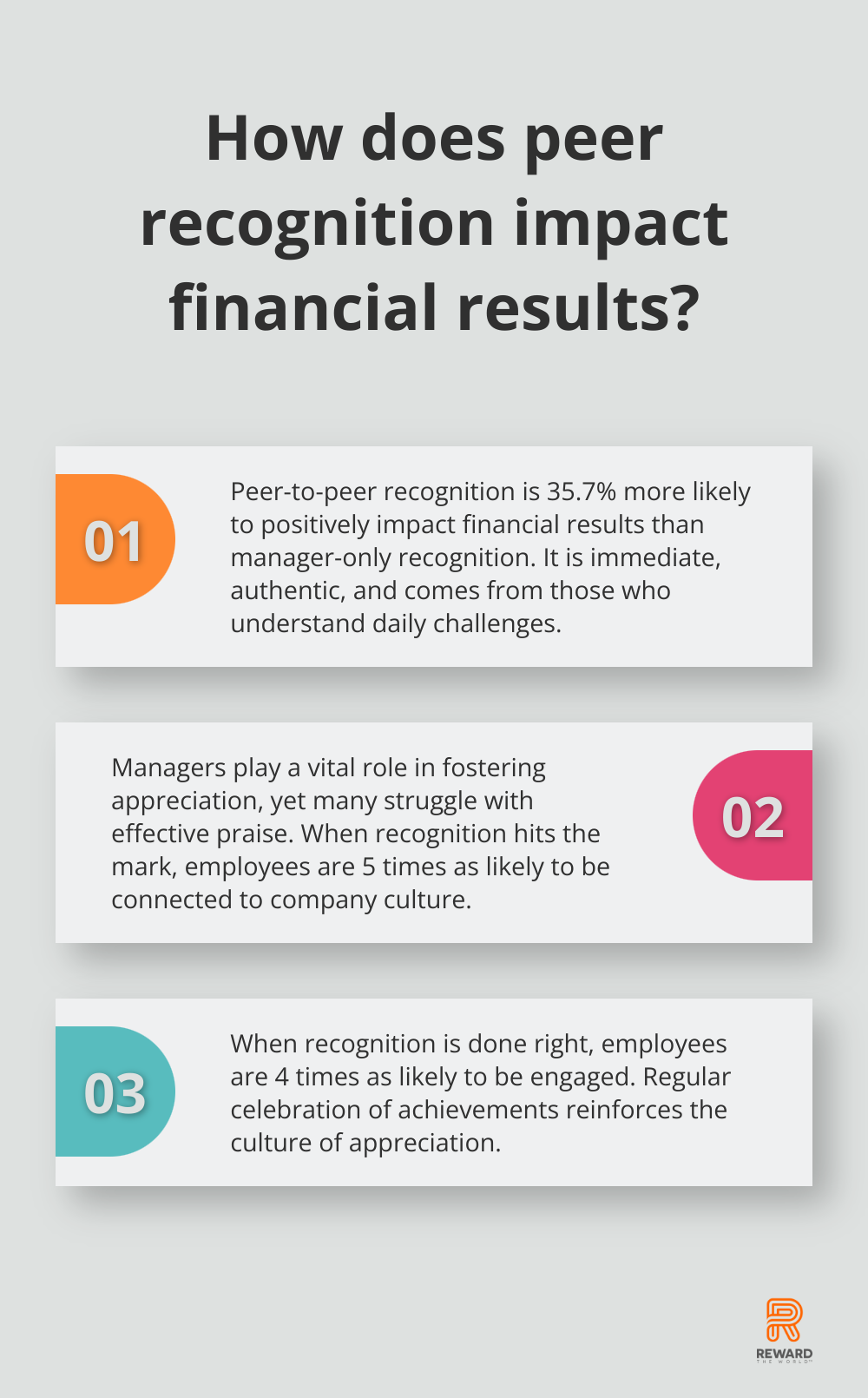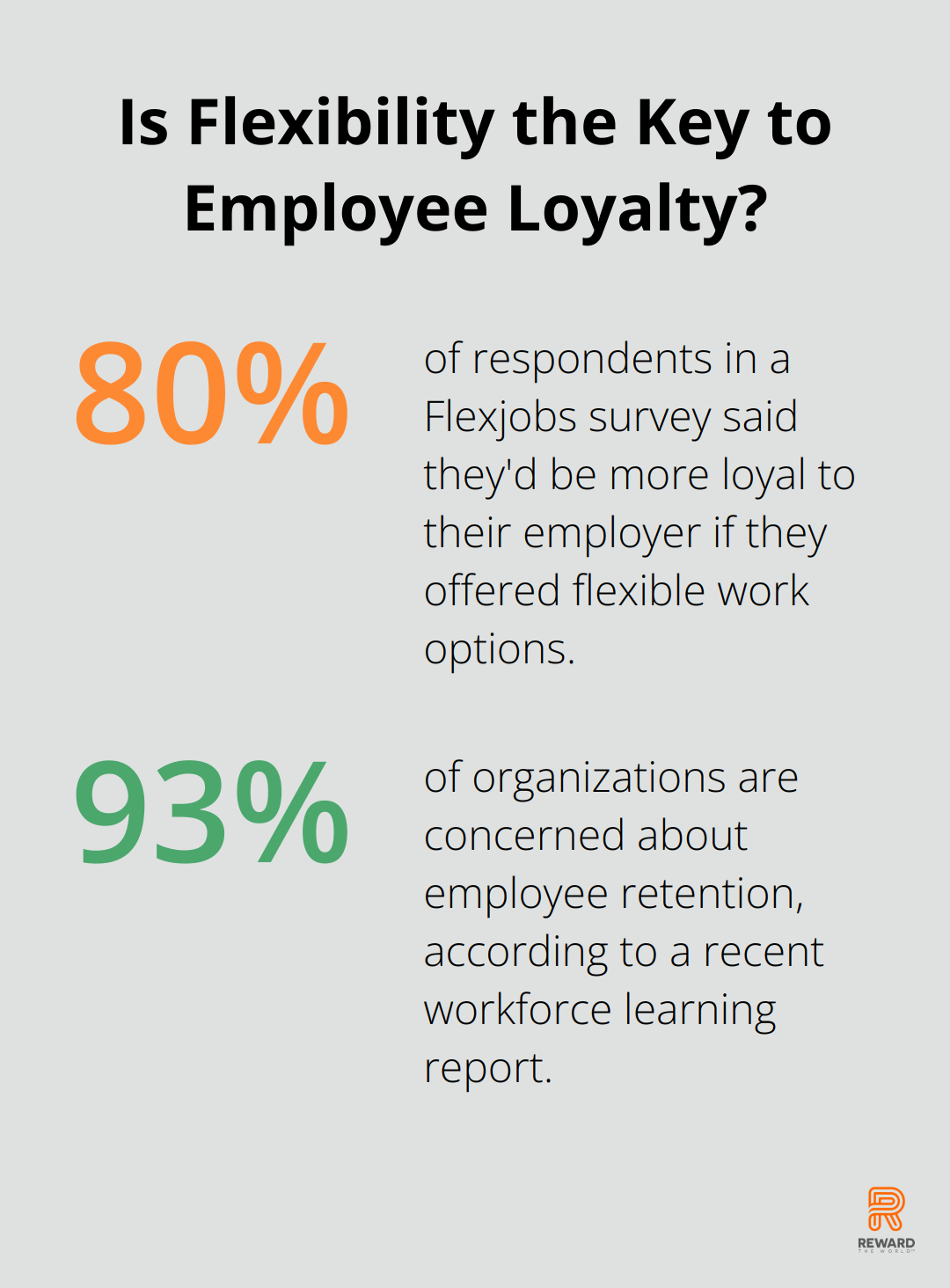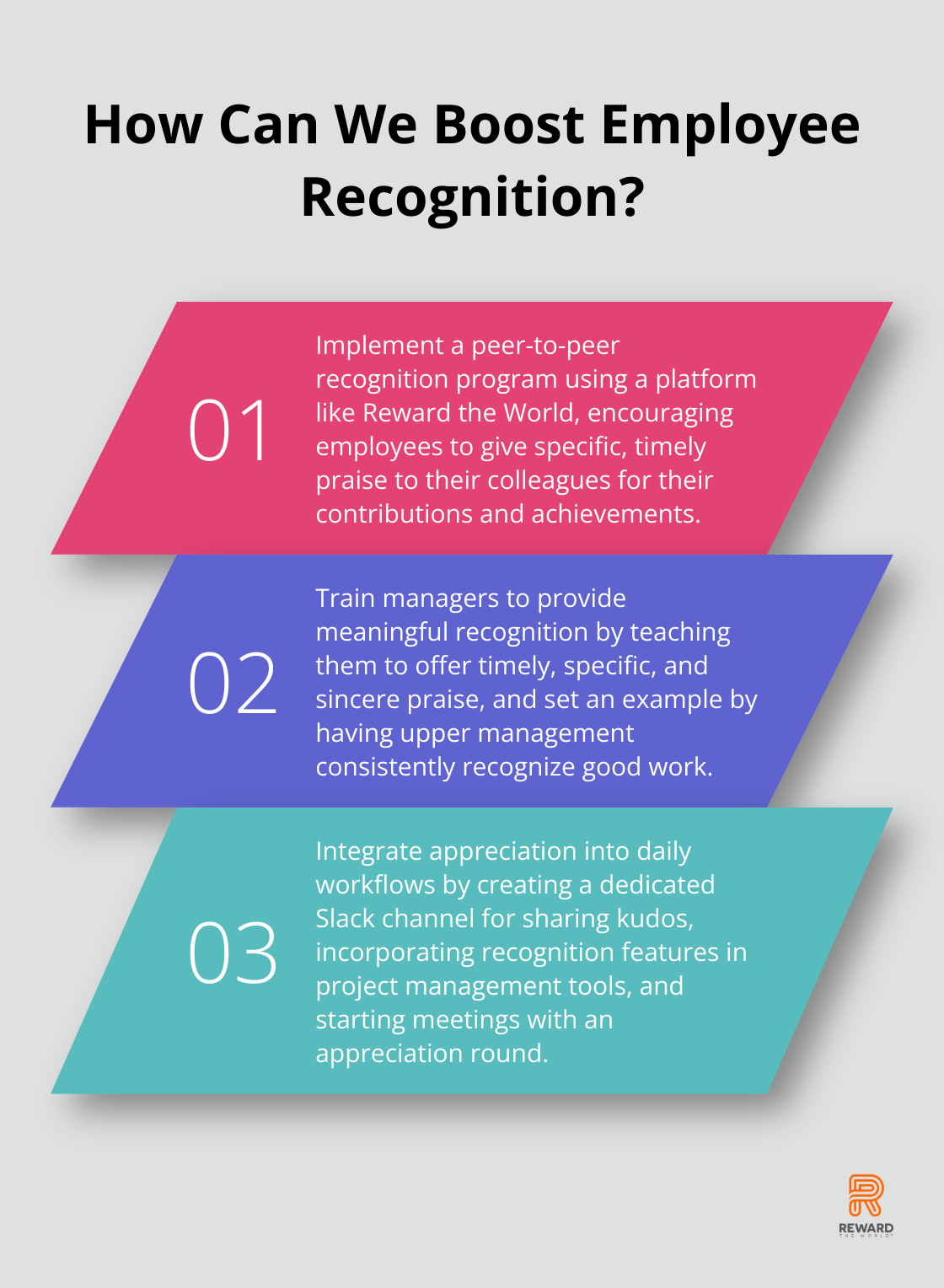
At Reward the World, we know that employee motivation is the lifeblood of any successful organization.
Natural reward strategies offer a powerful way to boost morale and productivity without relying on costly financial incentives.
In this post: Natural Reward Strategies for Employee Motivation, we’ll explore effective methods to recognize, appreciate, and empower your team members, creating a positive work environment that drives success.
The Power of Recognition in the Workplace
Recognition: A Cornerstone of Success
Recognition stands as a fundamental pillar of a thriving workplace. It transforms team dynamics and propels organizational success to new heights.
Boosting Morale Through Appreciation
Employee recognition profoundly impacts morale. Gallup’s data reveal that the most effective recognition is honest, authentic and individualized to how each employee wants to be recognized. This approach to appreciation directly translates to increased job satisfaction and a more positive work environment.
Effective Forms of Recognition
Recognition manifests in various forms, each with its unique impact:
- Verbal praise: A timely and specific “thank you” or “great job” can significantly motivate employees.
- Written acknowledgment: Emails, handwritten notes, or mentions in company newsletters provide a lasting record of appreciation.
- Public recognition: Highlighting achievements in team meetings or company-wide forums amplifies the impact and inspires others.
The Productivity-Retention Connection
Effective recognition strategies yield tangible business outcomes. A Deloitte study with Facebook found that only 14 percent of organizations are ready to improve productivity, performance, and engagement through work.

Recognition also plays a vital role in retention. SHRM reports that 79% of employees state an increase in recognition rewards would enhance their loyalty to their employer. This fact holds particular importance in today’s competitive job market, where attracting and retaining top talent presents a constant challenge.
Practical Steps for Implementation
To harness the power of recognition, consider these actionable steps:
- Train managers in meaningful recognition. Ensure they understand the importance of timely, specific, and sincere praise.
- Implement a peer-to-peer recognition program. This approach fosters a culture of appreciation at all levels of the organization.
- Leverage technology. Platforms like Reward the World (our top choice) offer seamless ways to integrate recognition into daily work life, making it easy for employees to give and receive appreciation.
The impact of recognition extends far beyond a simple morale boost. It serves as a powerful tool for creating a motivated, productive, and loyal workforce. As we move forward, we’ll explore how to cultivate a culture of appreciation that permeates every level of your organization.
Building a Culture of Appreciation
Creating a culture of appreciation transforms how your organization operates. It values people and their contributions at its core. Here’s how to make it happen:
Harness the Power of Peer Recognition
Peer recognition changes the game. A study found that peer-to-peer recognition is 35.7% more likely to positively impact financial results than manager-only recognition. It works because it’s immediate, authentic, and comes from those who understand daily challenges.

To implement an effective peer recognition program:
- Select the right platform (Reward the World offers an intuitive interface that simplifies peer recognition).
- Establish clear guidelines. Teach employees what constitutes meaningful recognition.
- Increase visibility. Use company-wide channels to showcase peer recognition, amplifying its impact.
Transform Managers into Recognition Champions
Managers play a vital role in fostering appreciation. Yet, many struggle with effective praise. A Gallup poll revealed that when recognition hits the mark, employees are five times as likely to be connected to company culture and four times as likely to be engaged.
To address this, invest in manager training:
- Teach specific praise. “Your clear explanation of the data really helped the client understand our proposal” trumps a generic “Great job on the presentation.”
- Promote frequent, timely recognition. Don’t wait for annual reviews.
- Set the example. When upper management consistently recognizes good work, it sets the tone for the entire organization.
Make Achievement Celebration a Habit
Regular celebration of achievements (both big and small) reinforces the culture of appreciation. It acknowledges the everyday efforts that drive success.
Try these methods to make celebration habitual:
- Begin meetings with an appreciation round. This sets a positive tone and ensures regular recognition.
- Create a “Wall of Fame” (physical or digital) to display achievements.
- Implement a points system for achievements, redeemable for rewards. (Reward the World’s platform excels at this, offering diverse reward options.)
Integrate Appreciation into Daily Workflows
To truly embed appreciation into your culture, it must become part of everyday work life. This integration ensures that recognition isn’t an afterthought but a natural part of how your team operates.
Consider these strategies:
- Use project management tools that include built-in recognition features.
- Encourage “appreciation moments” during team stand-ups or daily check-ins.
- Create a dedicated Slack channel (or similar platform) for sharing kudos and wins.
As we move forward, let’s explore how non-monetary rewards can further drive motivation and complement your culture of appreciation.
Non-Monetary Rewards That Drive Motivation
At Reward the World, we recognize that monetary rewards aren’t always feasible or sustainable for every organization. Numerous non-monetary strategies can significantly boost employee motivation and engagement. Let’s explore some of the most effective approaches.
Embracing Flexibility
Flexible work arrangements have become increasingly important to employees. A Forbes article reported that 80% of respondents in a Flexjobs survey said they’d be more loyal to their employer if they offered flexible work options. This could include:
- Remote work opportunities
- Flexible start and end times
- Compressed workweeks
- Job sharing
These options demonstrate trust in your employees and acknowledge their need for work-life balance. It’s a powerful motivator that costs little to nothing for most organizations.
Investing in Professional Growth
Employees value opportunities to develop their skills and advance their careers. A recent workforce learning report revealed that 93% of organizations are concerned about employee retention-and the number one way to address this is through learning and development initiatives.

Consider offering:
- Mentorship programs
- Cross-departmental training
- Conference attendance
- Online course subscriptions
- In-house workshops led by senior staff
These initiatives not only motivate employees but also benefit your organization by cultivating a more skilled workforce.
Empowering Through Autonomy
Granting employees more control over their work can significantly boost motivation. Research has shown that job autonomy positively relates to job satisfaction and performance.
To increase autonomy:
- Allow employees to choose their projects when possible
- Encourage decision-making at all levels
- Implement a results-only work environment (ROWE)
- Create self-managed teams for specific projects
Autonomy doesn’t mean a lack of accountability. It’s about trusting employees to manage their responsibilities effectively.
Recognition and Appreciation
Non-monetary recognition can be just as powerful as financial rewards. Implementing a robust recognition program can significantly impact employee motivation and engagement.
Try these strategies:
- Implement a peer-to-peer recognition program
- Celebrate milestones and achievements publicly
- Offer additional time off as a reward for exceptional performance
- Provide opportunities for high-performing employees to lead special projects
These non-monetary reward strategies can create a more engaged, productive, and loyal workforce. They address deeper motivational needs and complement tangible reward systems, resulting in a comprehensive motivation strategy that caters to diverse employee preferences.
Final Thoughts
Natural reward strategies offer a powerful approach to boost employee motivation without relying on financial incentives. Organizations can create a work environment that values and empowers employees through recognition programs, appreciation cultures, and non-monetary rewards. The key to success lies in understanding that motivation varies among individuals, necessitating tailored strategies to meet unique needs.

A recognition-rich work environment yields long-term benefits beyond immediate employee satisfaction. It cultivates a positive company culture, enhances productivity, improves retention rates, and contributes to overall organizational success. As employees feel valued and appreciated, they become more engaged, innovative, and committed to their work and company goals.
We at Reward the World understand the importance of implementing effective natural reward strategies. Our global incentives platform offers a comprehensive solution for businesses looking to enhance their employee recognition programs. With a wide range of reward options (and seamless integration capabilities), we make it easy for organizations to create an appreciation culture that drives motivation and success.
